RWA tokenization is a historic opportunity for digital asset finance in Hong Kong, and retail products may become the key trigger point.
Written by: Web3 Farmer Frank
Digital asset finance is a historic opportunity that Hong Kong cannot afford to miss.
Since the official announcement of the virtual asset policy declaration on October 31, 2022, Hong Kong has become one of the most steadfast and proactive jurisdictions in the global international financial center to embrace Web3 and digital assets. From the Hong Kong government's clear and solemn policy commitments to the institutional support from regulatory bodies like the Securities and Futures Commission and the Monetary Authority, Hong Kong is making significant strides toward the innovative frontier of digital asset finance.
Among these, the tokenization of real-world assets (RWA) is a key component of the Hong Kong government's digital asset finance strategy. Notably, on August 28, 2024, the Hong Kong Monetary Authority officially launched the "Ensemble" sandbox program, which will utilize experimental tokenized currencies to facilitate interbank settlements and focus on the study of tokenized asset trading. This marks the government's forward-looking layout in the field of tokenized assets and demonstrates Hong Kong's determination to become a global center for RWA tokenization.
According to the latest data from the RWA research platform rwa.xyz, the total market size of RWA currently exceeds $13 billion, and BlackRock's forecast is even more optimistic: by 2030, the market value of tokenized assets is expected to reach $10 trillion, which means a potential growth space of over 75 times in the next seven years!
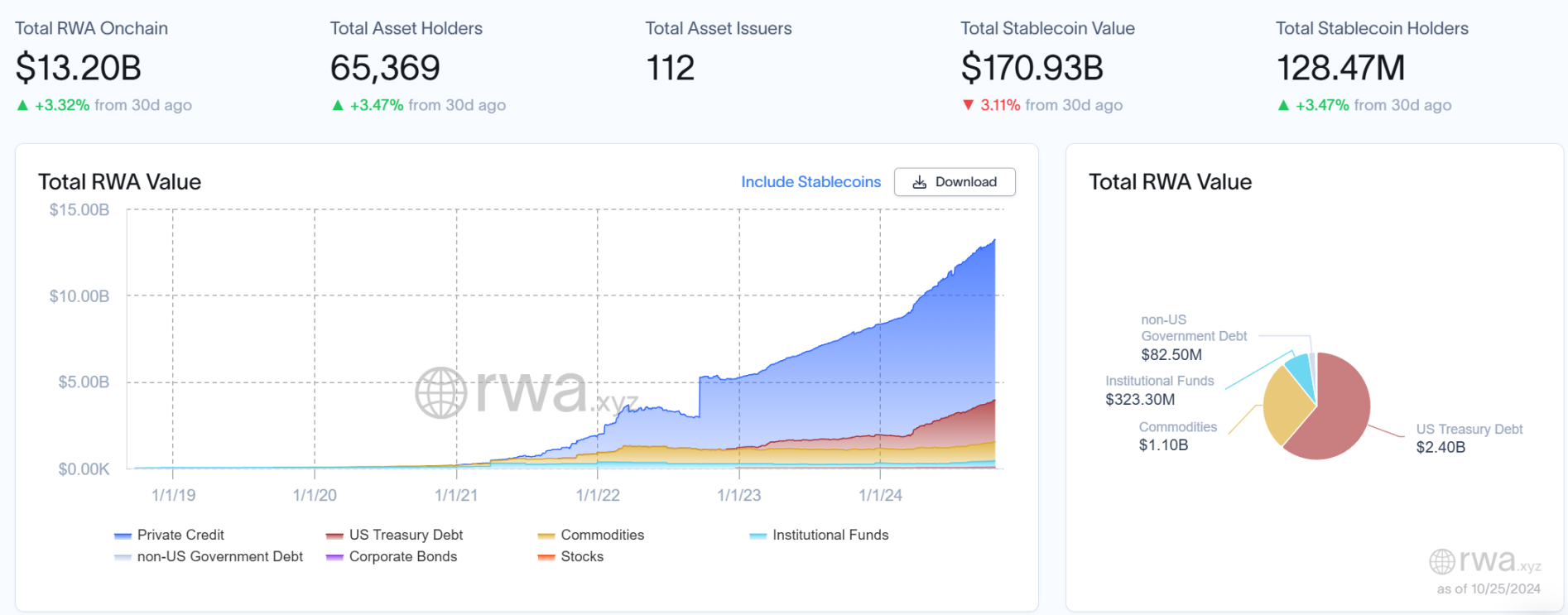
Source: rwa.xyz
Such a vast incremental space lays the market foundation for Hong Kong to become a global RWA tokenization hub. It is worth noting that during this Hong Kong FinTech Week, OSL has officially announced its collaboration with Huaxia Fund to launch a tokenized fund project aimed at retail investors in Hong Kong within the framework of the Ensemble project, and has partnered with Franklin Templeton to conduct a concept verification for on-chain financial products (including money market fund tokens).
This article will provide an initial understanding of the "Ensemble" project and analyze the layout and potential of retail RWA products, such as the tokenized fund project explored by OSL, in the Hong Kong market, as well as whether Hong Kong has the potential to achieve a global leading position in digital asset finance.
Hong Kong's Crypto Ambitions Behind "Ensemble"
The "Ensemble" project is not a whimsical idea from Hong Kong in the field of digital asset finance, but rather a profound strategy to solidify its position as an international financial center while laying the groundwork for digital asset finance.
As early as March 2024, the Hong Kong Monetary Authority officially announced the "Ensemble" project, clearly stating its support for the development of the tokenized market in Hong Kong, initially focusing on tokenized deposits (i.e., digital forms of commercial bank deposits issued and provided to the public by commercial banks).
Subsequently, the "Ensemble" sandbox will further study and test tokenization use cases, including the settlement of tokenized real-world assets (such as green bonds, voluntary emission reductions, airplanes, electric vehicle charging stations, electronic bills of lading, and treasury management), which may develop into new financial market infrastructure, serving as a bridge between tokenized real-world assets and tokenized currencies in transactions.
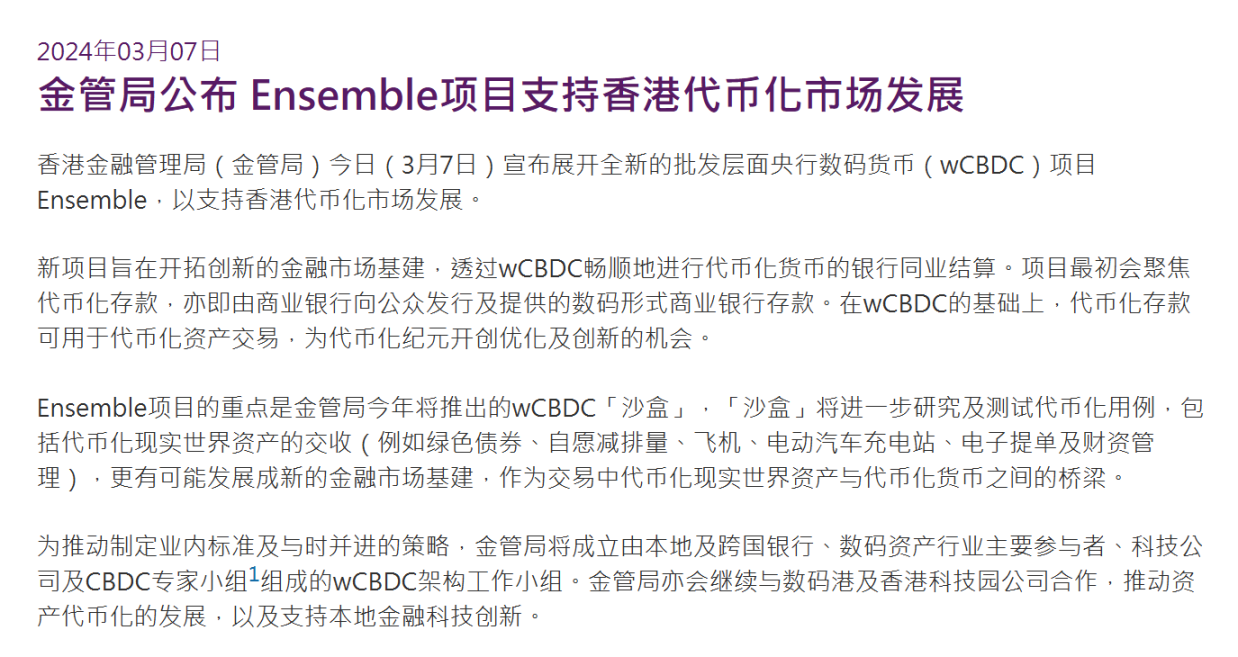
Source: Hong Kong Monetary Authority
In simple terms, the Hong Kong government and financial regulatory agencies have been loosening policies for the digital asset industry for years and promoting innovative development in the industry. The emergence of the "Ensemble" project is a digital asset finance experimental platform created by Hong Kong in this context. It not only helps Hong Kong establish a compliance-oriented testing system but also provides opportunities for future digital asset innovation.
As is well known, RWA tokenization refers to the process of tokenizing physical assets (such as bonds, gold, real estate, and other commodities) into digital assets on the blockchain, bringing exclusive advantages that are difficult to match by both on-chain native assets and traditional financial assets:
- Cost-effectiveness improvement: First, tokenization eliminates the need for intermediary brokers, significantly reducing transaction costs and improving efficiency;
- Better accessibility: Second, tokenization allows traditional assets to be divided into smaller shares, thereby enhancing accessibility and liquidity;
This means that RWA can become a major driving force for the incremental growth of on-chain digital assets, effectively reaching the vast asset pool of traditional markets, such as the global bond market ($133 trillion) and the gold market ($13.5 trillion)—under the framework of tokenization, these physical assets can not only enter the on-chain trading ecosystem but also generate DeFi yields through lending and staking, introducing real yield asset support to the digital asset market and enhancing its value foundation.
Since Compound ignited the DeFi summer in 2020, the digital asset market has seen significant growth, with an on-chain Total Value Locked (TVL) reaching $88 billion as of October 25, 2024. However, compared to the trillions of dollars in tokenizable RWA assets (bonds, gold, stocks, real estate, etc.), this volume still seems insignificant. Therefore, RWA tokenization will undoubtedly bring strong incremental momentum to on-chain assets.
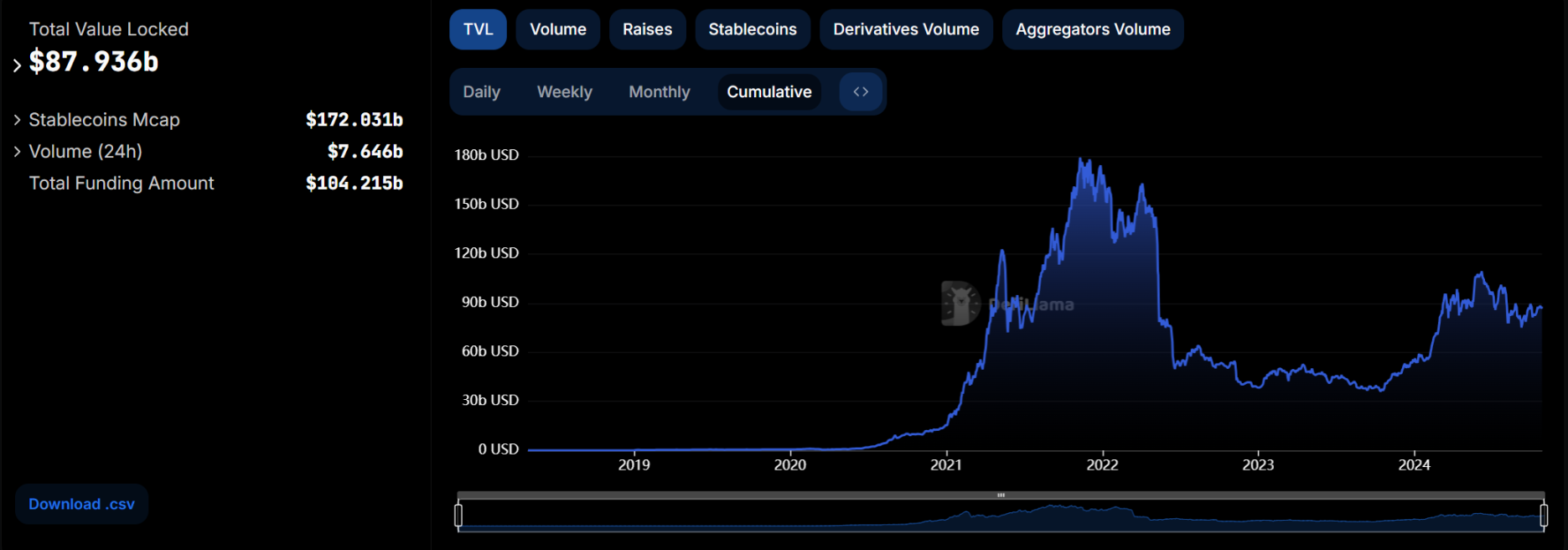
Source: DefiLlama
It is foreseeable that as RWA tokenization gradually becomes widespread, the on-chain world will undergo deeper transformations, with the boundaries between traditional finance and digital finance becoming increasingly blurred. The asset system on-chain will not only expand significantly in scale but also achieve breakthroughs in compliance and transparency, providing global investors with more diversified choices.
This is precisely the significance of the "Ensemble" project: by building a highly innovative testing platform, Hong Kong is conducting forward-looking explorations for the deep integration of the digital asset finance ecosystem. Its new products and models will serve as a "rehearsal" for the next stage of digital asset innovation in Hong Kong, providing strong momentum for Hong Kong to become a global RWA tokenization hub.
Moreover, the collaboration between OSL, Huaxia Fund, and Franklin Templeton is precisely aimed at promoting the integration of traditional finance and digital asset finance, enhancing on-chain compliance and transparency, and laying a solid foundation for the future expansion of the digital asset market.
RWA Tokenization: A Train of Opportunity for Hong Kong in the Crypto Era?
The demand for RWA tokenization in Hong Kong stems from its deep financial cultural background as an international financial center. First, RWA tokenization provides a new opportunity for the integration of digital assets and traditional finance, allowing funds, bonds, equities, and more to be tokenized through blockchain technology and digital assets, thereby improving asset liquidity and accessibility.
At the same time, the vast and mature asset targets and scale required by the RWA market are precisely the comfort zone for Hong Kong as an international financial giant—it encompasses a rich variety of financial services, with years of accumulation and extensive experience, a mature risk control system, complete trading infrastructure, and a large customer base.
These advantages can help Hong Kong quickly bring RWA assets on-chain, providing compliant and secure trading solutions for the market, and becoming a bridge between Web2 and Web3.
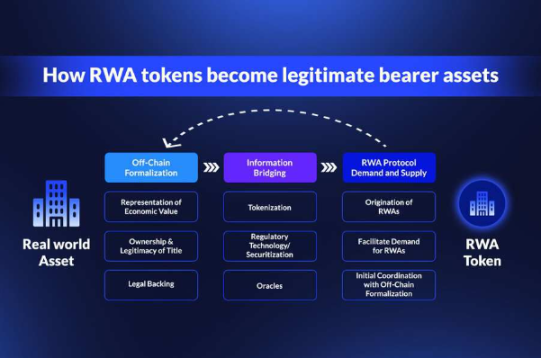
Source: Miles Deutscher
In other words, it is about bridging on-chain and real-world assets, which is a solution that is extremely lacking and sought after in the integration of digital asset finance and traditional finance. For this reason, under the framework of the "Ensemble" project, Hong Kong has set four key themes for experimental testing of RWA tokenization—fixed income, investment funds, securitization, and trade financing, with fixed income and investment funds being regarded as the initial experimental focus of RWA tokenization.
Taking OSL's collaboration with Franklin Templeton in the Ensemble project to conduct concept verification for tokenized fund products as an example, as a representative of this exploration, this initiative is expected to promote the on-chain and transparency of fixed income products, bringing innovative changes to the asset management field:
- Compliance and security: OSL relies on the compliance testing platform of the Hong Kong Monetary Authority to ensure that tokenized funds meet regulatory standards, providing a safe and reliable investment channel for global investors;
- Increased liquidity and transparency: Tokenization allows fund products to be transparently traded on the blockchain, with assets being able to be divided into smaller amounts, increasing liquidity and allowing investors to enjoy the liquidity and transparency advantages of decentralized markets;
- Efficiency improvement and cost optimization: Tokenization simplifies the management processes of traditional funds, reducing intermediary costs and making fund products more inclusive, thereby attracting a broader retail investor base;
In short, the collaboration between OSL and Franklin Templeton on tokenized investment fund products theoretically not only significantly enhances settlement speed and efficiency but also lowers the entry threshold by allowing small investments, bringing new sources of liquidity to the market and further promoting the development and popularization of the RWA market.
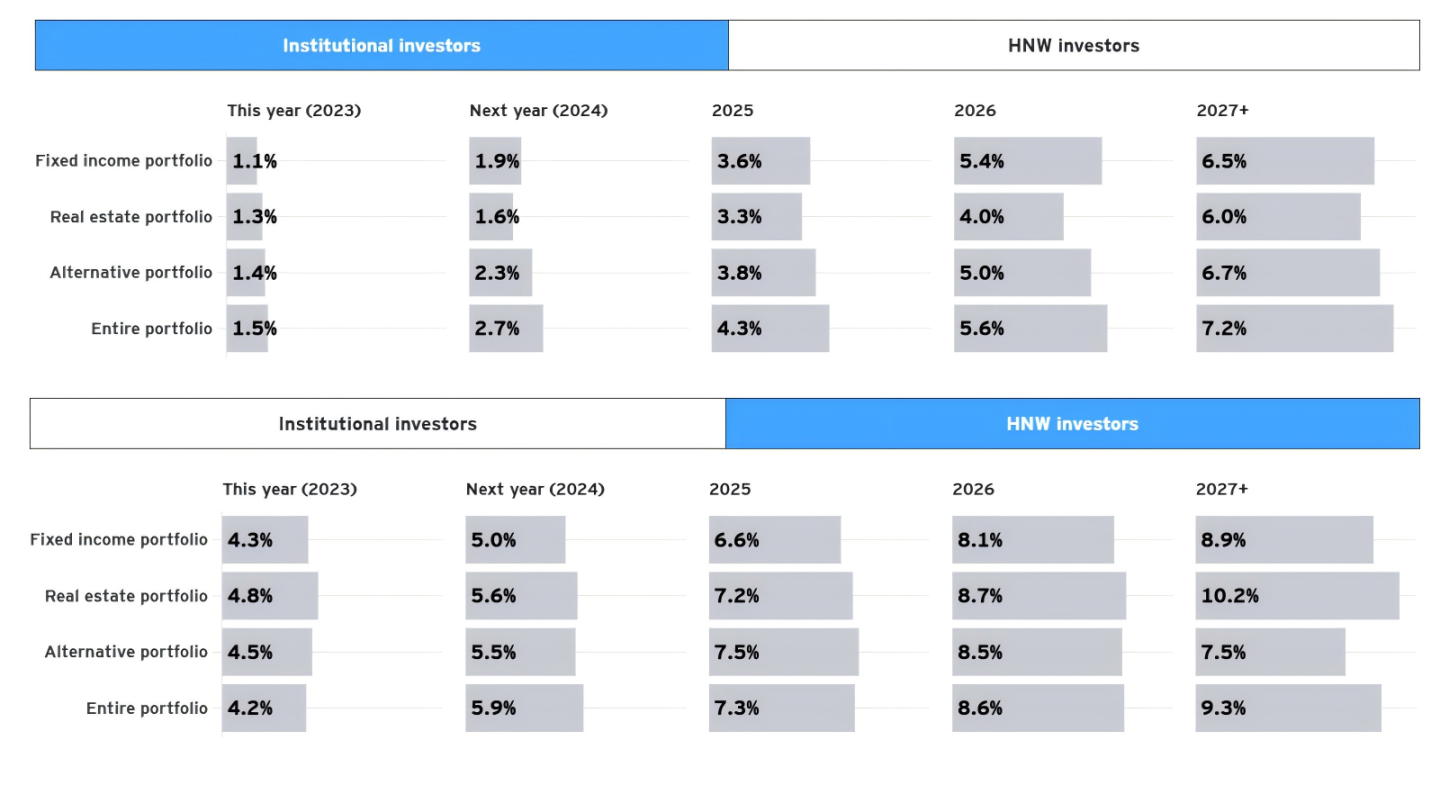
Source: EY
In the future, RWA tokenization, represented by investment fund products, will bring new sources of liquidity to the Hong Kong market and promote its global popularization:
According to EY's forecast, by 2026, institutional and high-net-worth investors are expected to allocate 5.6% and 8.6% of their portfolios to tokenized assets, which also means that in the three years starting from this year, the incremental increase in institutional and high-net-worth investors' allocation to RWA tokenization investments will generally exceed 100%.
Retail Products May Be the Trigger Point for RWA?
In the past five years, what has been the most successful digital asset financial product globally?
The answer is not difficult to guess; it is neither the on-chain financial innovations that ignited the DeFi Summer, such as Uniswap, nor the digital artworks that sparked the NFT craze, such as CryptoPunks, but rather the stablecoins that everyone has long been accustomed to.
Indeed, stablecoins with RWA attributes aimed at ordinary users have become one of the widely accepted use cases for digital assets—just the TRC20 version of USDT has over 40 million on-chain accounts, truly achieving the goal of making blockchain no longer a celebration for the few, significantly broadening and deepening the user base of Web3 and digital assets.
Major TradFi institutions such as BlackRock, Citibank, Franklin Templeton, and JPMorgan are also focusing on such products, aiming to further expand the application of digital assets in everyday financial life. Currently, the circulating tokenized government bond fund led by Franklin's on-chain U.S. government money market fund (FOBXX) and BlackRock's U.S. dollar institutional digital liquidity fund (BUIDL) has nearly reached $1 billion, laying a solid foundation for the application of RWA tokenization products in the retail market.
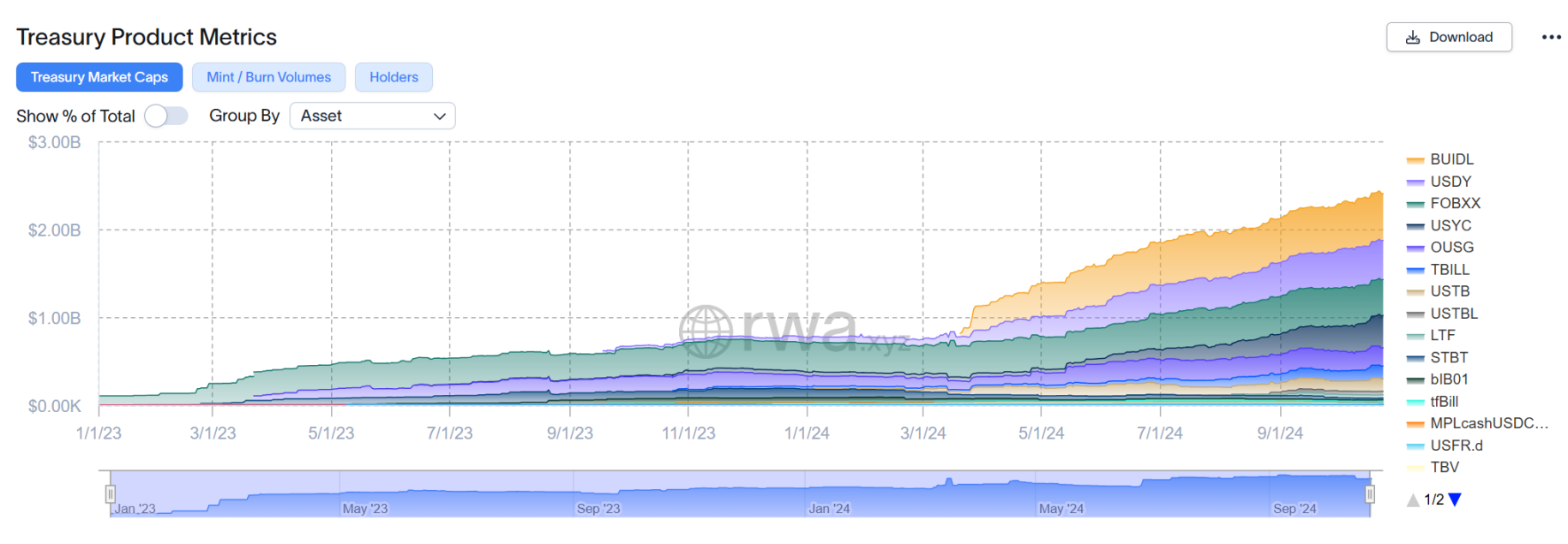
Objectively speaking, retail RWA tokenization products possess the inclusive advantage of attracting more ordinary investors to participate: In the past, ordinary investors faced high capital thresholds and complicated trading processes to participate in traditional financial markets such as U.S. government bonds, real estate, or high-end stocks. Now, through RWA tokenization, these assets can be divided into smaller trading units, significantly lowering the investment threshold.
More importantly, retail RWA products enhance risk control capabilities through the transparency of blockchain, bringing higher trust to investors and promoting further application and popularization of digital assets in everyday financial life. In the field of RWA tokenization in Hong Kong, a number of digital asset companies are also promoting compliant RWA innovation and promotion.
Among them, OSL, as Hong Kong's first licensed virtual asset platform, plays a key role in this process, especially understanding the strategic significance of retail RWA products for Hong Kong's digital asset ecosystem. Therefore, it is actively committed to bringing tokenized assets into the mass market, including leveraging its policy advantages as a compliant platform to expand partnerships with traditional financial institutions to provide compliant RWA trading services for clients.
- Hong Kong's first licensed platform with rich experience: As the first trading platform in Hong Kong to be granted a virtual asset license, OSL has over six years of rich experience in the digital asset industry;
- Extensive cooperation with top traditional financial institutions: OSL has collaborated with financial institutions such as UBS, Huaxia Fund, Harvest Fund, and Franklin Templeton to promote projects like digital asset ETFs and investment fund tokenization, establishing solid partnerships;
- Compliance assurance and insurance coverage: OSL adheres to strict regulatory requirements, providing a compliant and secure cooperation environment for financial institution partners, while also obtaining the world's largest insurance coverage of $1 billion, making it the single digital asset custodian with the highest coverage amount and the longest coverage period globally;
- Full product line and comprehensive service license: OSL initially started with over-the-counter trading in Hong Kong and has now obtained a complete license to provide tokenization projects, offering comprehensive solutions—covering the issuance, custody, trading services, asset distribution, and blockchain technology services of digital securities;
It is important to note that in terms of business models, RWA encompasses multiple levels from underlying infrastructure to upper-layer DeFi. OSL and others can provide underlying infrastructure services, responsible for tokenizing physical assets and custodizing them on-chain; at the same time, they can also engage in intermediate layer services, bringing asset yields into the DeFi space to provide investors with more yield opportunities.
Overall, OSL's layout not only helps Hong Kong strengthen the connection between Web3 and traditional finance but also brings higher trust and convenient participation experiences to investors through compliant asset management and risk control.
Conclusion
For Hong Kong's exploration of digital asset finance, RWA tokenization is indeed a "paradigm shift" worth looking forward to. If a method can be found to legally combine on-chain digital assets with real-world assets, and if retail forms of promotion attempts, such as those by OSL and Huaxia Fund, are successful, it is not out of the question that this could be the next "trigger point" for digital asset finance.
From this perspective, the role played by OSL also highlights Hong Kong's advantages in global digital asset finance innovation—being one of the oldest virtual asset companies in the world, OSL possesses deep expertise in digital assets, which ensures the compliance and transparency of RWA tokenization projects. This is also Hong Kong's unique natural advantage:
As an international financial center, Hong Kong has abundant traditional financial resources, whether it is a mature risk control system, complete trading infrastructure, or a large customer base, all of which support its ability to bring funds, stocks, gold, and other RWAs on-chain through RWA, completely releasing their liquidity.
We are confident in looking forward to its early arrival.
免责声明:本文章仅代表作者个人观点,不代表本平台的立场和观点。本文章仅供信息分享,不构成对任何人的任何投资建议。用户与作者之间的任何争议,与本平台无关。如网页中刊载的文章或图片涉及侵权,请提供相关的权利证明和身份证明发送邮件到support@aicoin.com,本平台相关工作人员将会进行核查。




